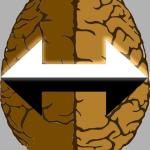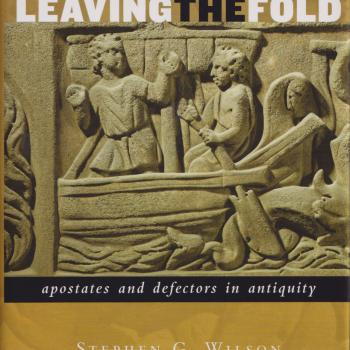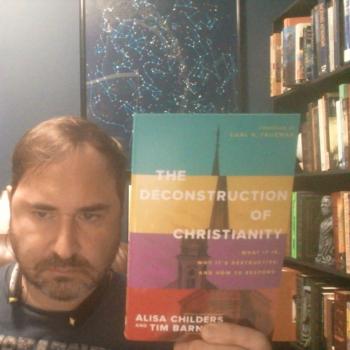
I began looking onto deconversion as a journalist. I wanted to look at stories of Christians who had famously become atheists, and see how their stories were similar. Little did I know that I was on the crest of a movement.
Back in 2016 when I ran a series on the conversion of atheists (still a cutting-edge topic in conversion research), it was common knowledge that Christians left the faith to become atheists. In fact, some of my atheist readers were eager to point this out as I published my stories. Stories of Christians dropping off to become atheists were old news. Richard Dawkins, for instance, had been raised in the church. By 2016, former pastor John Loftus was very much in the spotlight with his book on debunking faith, and most outspoken atheists had been involved in church at some point.
So when I began my project, the term “deconversion” was in fairly common use. After doing journalistic research on deconverts, I began to look into the issue further. I started looking into the psychological literature regarding deconversion. There was not yet a lot of research on the market, but enough for me to see the debate in the psych community about which term to use in order to describe the phenomenon. Some opted for “apostacy,” others with “religious exit,” and still others argued that the term “conversion” should be comprehensive: covering moving into and out of religion respectively.
However, the majority consensus was that “deconversion” was the common term to be used.
After studying the social science research on the phenomenon, I began to subscribe to podcasts, YouTube channels, and forums in which deconverts talked about their experience. It was here that I began to see the word “deconstruction” in popular use.
Deconstruction as a Pop Term
People who exit their religion in the manner of deconversion have formed their own subculture. The history of the development and formation of this subculture is difficult to trace, but it has certainly gained momentum since around the year 2018. Subcultures need names, and the name adopted by this subculture is “deconstruction.” As a word, it seems to make sense. After all, “construction” is building something, so “deconstruction” would seem to mean taking that thing apart. And this is the way in which many deconverts describe their experience. They began to see the problems with individual beliefs, dissected those beliefs, and then found further problems with the entire belief structure. They tore down the wall of religion which held them in, and have emerged as the hero of their story, having destroyed – or “deconstructed” – that which held them in.
However, “deconstruction” was not simply reserved for those who had discarded their faith entirely. It has become a term describing the very act of questioning, examining, and re-structuring one’s beliefs rather than passively accepting them. Classical mantras like “Question everything,” or “be skeptical of everything,” are now joined with the equivalent expression: “Deconstruct everything,” which means the same thing.
Whoever or however the term was first used, it is now used because it is the label which describes the community and the process.
Deconstruction: A History of the Term
The word “deconstruction” originated in the post-modern philosophy movement, and related specifically to language. Language, said the postmodernists, is fluid. Each person uses language to reference their own experience, but their personal experience is unique to them. Therefore, what the author writes can only be understood in terms of the author’s experience. If I read a poem or a story, and don’t take into account the author’s experience, I am reading a different story than what the author wrote, because I am translating it through my own use of language, which is unique to me.
“Deconstruction” aimed to rip language apart, eviscerate it, and ensure that language had no set meaning or universal reference. An author’s words were framed in terms of the author’s “narrative” such that, while Sherlock Holmes seemed to be about a detective solving crimes, it was, in fact, about colonialism, since it was written by a British author in the 1800’s, and this was the quintessential British experience.
Purposely or not, the act of “deconstructing” religion exercises similar techniques. Religious language is dissected and re-framed to have any sort of sinister meaning that places it in light of the evils superimposed upon that religion.
Deconstruction in Practice
In developing my model of deconversion, I briefly incorporated the term “deconstruction” into the process to specifically describe those individuals who, at one point, made intentional efforts to destroy their religious beliefs.
I discovered in my research that, as a person began exploring their doubts, they tended to go in one of two directions: they would either attempt to destroy those beliefs, or they would try to rescue them. Some people are actually motivated to extract themselves from religion, and when they give themselves permission to do so, they eagerly tear down the wall that has restricted them. Some, however, cling on to their religion, feeling some remorse about losing something so important to them.
Adapting to the popular vernacular, I briefly described the former process as “deconstruction.”
Deconstruction in Research
I removed the word “deconstruction” from my lexicon as a researcher for two reasons. The first was at the advising of philosopher and scholar Lydia McGrew, who suggested that one should not mingle philosophy and psychology. The second was the mere observation that “deconstruction” was not a term used in any of the psychological literature or research by my peers. It was simply not a term with any meaning to the psychological community which is interested in what causes deconversion and what deconversion looks like cognitively, behaviorally, or socially.
When a researcher studies deconversion, that researcher must start with an individual or population which has already deconverted. There is no feasible way to identify a person who is in the process of deconverting, or who potentially might deconvert from a research standpoint. So starting with a term that describes the completion of the process makes sense. When we examine deconversion, we are interested in examining a process which can be defined and quantified. Deconstruction is a term which does not belong in the psychological field.
So What is Deconstruction?
“Deconstruction” defines a movement. It is simply a trendy new name for a very old process: those who are standing up to or dropping out from the authority structure of the religious system. Generally this involves deconversion, but interestingly, it also includes individuals who retain some version of religion, simply different from the one in which they were raised. Deconstruction describes the latest trend of rebelling against the religious authority structure, which is increasingly associated with a political authority structure.

















